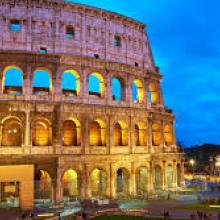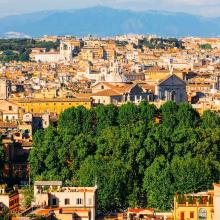Description
Join a band of ink-stained adventurers for a month of concentrated exercise and conversation in and about the Eternal City. We explore Rome from a variety of perspectives--as avid readers and intrepid writers, through history and geography, art and architecture, language and literature, not to mention the color and flavor of daily life in Italy, where they know carpe diem is more than a catch-phrase. Following in the footsteps of those poets, painters, saints and soldiers who for some two and a half millennia have traveled where all roads lead, we'll write our way into the heart of the city, poking into the foundations of civilization as we go, honing our writerly skills and enthusiasms in conversation, practice, and stride.
We welcome all students. No experience in literary analysis or creative writing is presumed. The Summer Creative Writing in Rome Program is open to anyone (undergraduates, graduates, graduate students, alumni, citizens-at-large) seeking to join an intensive program in the written arts. The ideal participant for this program will be interested in creative writing, ready to write and share their writing daily, ready to take intellectual and creative risks, open to the challenges and excitement of living in a foreign city, and open to having a grand adventure.
Evening classes will be held at the University of Washington Rome Center at the 17th-century Palazzo Pio, situated in the vibrant center of the city’s historical district, and morning classes will take place out and about in the city itself. We will walk everywhere. Daily field trips, museum visits, and excursions will be included in the program fee. Housing will be in shared apartments arranged by the UW Rome Center.
Read this article on how one recent program participant found creative inspiration through her math major - and how the program has influenced her choices since then.
Courses
Courses
ENGL 363: Roaming Rome: Rome from the Ground Up (5 Credits)
Roam Rome as you study its literature, art, architecture, archaeology, history, and culture. This course will take you out into the streets to see first-hand the founding and flourishing of the Roman empire and literature through archaeological sites, the great art of Western Civilization through Rome's countless museums, and the birth and rise of the Catholic church. Each day's walking tour and site visit will form the basis for that day's creative writing prompt.
Learning goals include:
The learning goals of this course are to deepen student understanding of Roman, Italian, Classical, and expat literature and art; architecture; history; and culture and to demonstrate how this art undergirds modern, post-modern and contemporary American and European literature (including the literature that the students are creating). The goals of this course will be assessed by tracking student participation in daily activities and by evaluating two student talks on Roman art, architecture, history, and/or culture.
This course may count as an English major elective in the Creative Writing or Language and Literature Pathways. Students may seek a pre-1900 upon faculty approval which must occur prior to arrival in Rome.
ENGL 493: Writing Rome: Creative Writing Conference (5 Credits)
Rome from a writer's perspective: what can we carry away, and what carries us? Notebooks in hand, we'll test those questions in reading, writing, and conversation. We'll consider what it means to be an artist by walking the cobbles daily and filling our writer's sketchbook what what we see, hear, smell, feel, and think, and so, in literary terms, sack the city at the center of the world.
Learning goals include:
The learning goals of this class include learning how to experience the world as a writer by noting daily observations of the world in a writing journal and learning how to use daily observations to open lines of inquiry. Students will also practice transforming daily “sensory” observations of the world into literary forms like poems, short stories, and short creative nonfiction. Goals will be assessed by tracking student participation in daily site visits, listening to daily observations/writing in “workshop”, and by evaluating final student portfolios.
This course can be tailored to meet appropriate Creative Writing requirements and may also count as a creative writing elective for English Language and Literature majors.
ENGL 395: Reading Rome (2 Credits)
Read, discuss, and study works from some of Rome’s great poets, writers, and historians across the ages. Includes a particular emphasis on American, German, and British writers of the Grand Tour and the Romantic period who traveled to Rome. Works will be studied with the intent to unpack them and borrow their secrets for our own writing.
Learning goals include:
The learning goals of this course are to deepen student understanding of Rome’s great poets, writers, and historians (native and expat), and to understand how these mentor texts might provide options, strategies, and forms for our own writing. The goals of this course will be assessed by tracking student participation in evening discussion groups and by evaluating student presentations on Rome’s poets, writers, and/or historians.
Cost
The program fee will be $5,315 (based on current exchange rates, though this may be subject to change). This fee includes: the $450 study abroad fee, instructional costs, room and board, and excursions. No additional tuition payment is required, resident and non-resident students all pay the same fees.
Fees do not include: airfare (approximately $1,200-1,500), food (approximately $40 per day), mandatory health insurance ($1.74 per day) and other health-related expenses, or personal spending money.
So how much might you spend on airfare, weekday lunches, and personal expenses?
Airfare is even less predictable than exchange rates, but you might spend up to $1,500 for a plane ticket. Personal expenses can be a tough thing to estimate, since they can vary so much from person-to-person, but considering that participants will already have paid their basic expenses as part of the program fee (program fee, room and board, excursions), personal expenses consist of food and pocket/shopping money. You can eat really well on $40 a day (€34 exchange rate as of 12/7/17) and if you are economical as little as $25 (€21 exchange rate as of 12/7/17); other costs will vary immensely depending on what you like to do, and whether you like to shop. Rome is a fairly expensive city with lots of good things to spend money on. A ballpark figure for a moderate spender has been about $1,000 for the five weeks ($200/week); if you like to shop and eat out a lot, it will be more, but if you are economical, you can get by with a little less.
Payment Schedule
Program fees will be posted to participants' MyUW student accounts and can be paid the same way that you pay tuition and other fees.
- $450.00 non-refundable Study Abroad Office fee due July 6, 2018.
- $4,865 (based on current exchange rates) remaining program balance due July 6, 2018.
Total fees: $5,315 (based on current exchange rates).
Note: Program fees are paid in dollars; most program expenses are paid in euro. The English Department program in Rome reserves the right to modify the program fee based upon dollar devaluation or severe inflation. In this unlikely event, students will be notified of the increase and an adjustment will be made to the final program payment.
Scholarships and Financial Aid
Matriculated UW students can apply most forms of financial aid to support their study abroad costs. Summer quarter financial aid requires a separate application from the academic year (Autumn, Winter, Spring quarter FAFSA). You can verify that your financial aid award will apply to your program costs by contacting the Financial Aid Office. Financial aid or scholarships awarded as tuition waivers or tuition exemptions might not apply so you will need to verify that these funds are eligible for use with study abroad by contacting the funding office.
Financial aid and most scholarships are disbursed according to the UW academic calendar (at the beginning of the quarter). If your program starts before the start of the UW quarter, your financial aid will not be available to you prior to your departure. If your program starts after the first day of the quarter, your financial aid will be disbursed at the start of the program. In either of these cases, you will have to finance any upfront costs such as airfare, health insurance and the start of your time abroad on your own. Please take this into consideration when you are making plans.
Revision Request:
In some instances you may qualify for an increase in your financial aid award (typically in loan funds). Check with the Financial Aid Office about your options. To request a revision in your aid, you will need to submit the following paperwork to the Financial Aid Office:
2. Budget of student expenses for your program: available under the "documents" tab on participants' study abroad accounts after a payment contract has been submitted to the Study Abroad Office.
Disbursement:
Please remember that financial aid and most scholarships will be disbursed according to the UW academic calendar (beginning of the quarter). If your program starts before the start of the UW quarter, your financial aid award will not be disbursed until after the start of the program. If your program begins after the start of the UW quarter, your financial aid award will be delayed until the start of the program. In either of these cases, you will have to finance any upfront costs such as airfare and health insurance and the start of your time abroad on your own. Please take this into consideration when you plan your foreign study.
Short-term Loans:
The Financial Aid Office does have a Short-Term Loan Program to assist students with temporary cash flow problems. To be eligible, students must be currently enrolled in regular classes in the UW Student Database. Students studying abroad during Summer quarter will need to apply for a short term loan before the end of Spring Quarter.
Scholarships:
UW Study abroad website provides Scholarship information to UW Study Abroad students who have been accepted into a study abroad program and have checked the appropriate scholarship box on their application. Please see: http://www.washington.edu/studyabroad/students/resources/finances/scholarships/
The UW Office of Merit Scholarships, Fellowships and Awards is an excellent resource for additional undergraduate scholarship advice and options.
Health Insurance
The University of Washington has a mandatory comprehensive health insurance plan that is specifically for students studying abroad on UW programs like the Department of English Summer in London Program. It has a very low premium: approximately $62 per month for the duration of the program.
Please visit the Study Abroad Website for more information.
Mandatory UW Study Abroad Health Insurance Plan
Withdrawal Policy
$350 of the total program fee and the $450 Study Abroad Office Fee are non-refundable once a payment contract has been submitted. Students withdrawing from the program will be responsible for paying a percentage of the program fee, determined by the date of withdrawal. More details about the withdrawal policy will be included in participants' payment contracts. No part of the program fee is refundable once the program has begun. The date of withdrawal is considered the date (business day) a withdrawal form is received by the Study Abroad Office.
Notice of withdrawal from the program must be made in writing, completing the following steps:
1. Provide notice in writing to the program director that you will no longer be participating in the program for which you have signed a contract and accepted a slot.
2. Submit a signed withdrawal form to the Study Abroad Office, 459 Schmitz Hall.
Dates & Deadlines
Application Deadline: January 31, 2018
Information Session: Friday, January 12th, 3:30-4:30pm in Schmitz Hall, room 450
Pre-Departure Orientations
Participants will be required to attend a total of three pre-departure orientations in Seattle during Spring quarter. Two of which will be offered by the UW English Department.
Program participants are also required attend a general in-person pre-departure orientation facilitated by the UW Study Abroad Office. Students must register for this orientation through their online study abroad accounts in order to attend scheduled orientations. For more information, visit the Orientation section of the Study Abroad website to view the current orientation schedule.
Any problems or financial losses that occur as as a result of not attending the orientations are entirely the responsibility of individual students.
Travel
Passports/Visas
Participants will need a passport to travel to Italy. It can take time for your passport application to be processed and your passport issued, so it's a good idea to get the wheels turning as early as possible. As of September 2015, according to the U.S. government's passport services website, the total cost is $135 for a 10-year passport, and the University Neighborhood Service Center, 4534 University Way NE, is the passport acceptance facility closest to campus. The most extensive passport information, including application procedures, fees, office locations, and even printable application forms you can download, is available from the State Department's passport services website. Some general information on applying for passports is also available by calling the National Passport Information Center toll-free number: 1-877-487-2778. An automated appointment line and some general information is available at the Seattle Passport Agency: (206) 808-5700.
As of September 1, 2010, students from countries with short-term visa exemption may enter Italy for academic purposes, for periods of up to 90 days, without a study visa. Citizens of the U.S., Canada, and EU countries fall into this category. Program participants from other countries should consult the Italian Consulate website to determine if they need visas in order to study in Italy. If a visa is required, students should review the application requirements on the Italian Consulate's website and contact the Study Abroad Office if they have questions and to receive an enrollment letter.
Important: Participants who need a visa to travel to Italy must apply in-person. Participants will need to make an appointment at the nearest Italian Consulate, which is in San Francisco, CA. The earliest you may submit your application to the consulate is 60 days from the start of the program (April 20).
**Please note that, regardless of citizenship, the 90 day period includes any travel before or after the study program within the entire Schengen area of the EU. Students who stay in the Schengen area beyond 90 days will be in violation of the 90-day visa waiver and risk being fined and/or detained and even banned from travel in the Schengen area for significant periods of time.**
Amy Feldman-Bawarshi
Academic Adviser
afeldman@uw.edu




